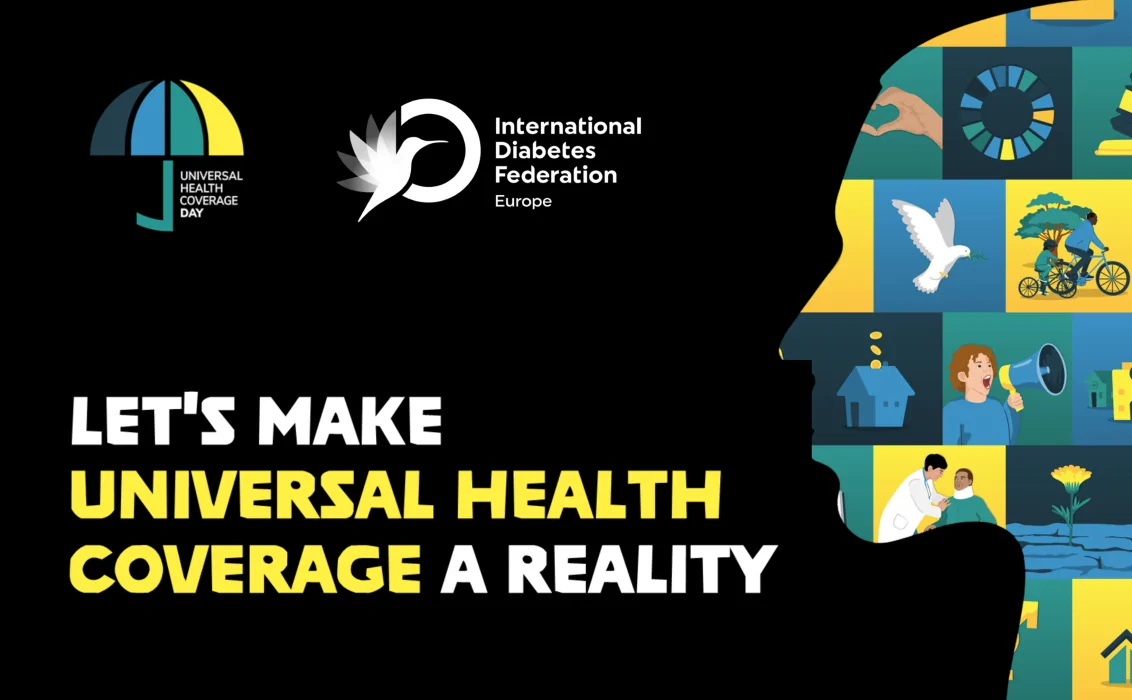Everything is possible, it’s all about how we choose to see things.
With 60 million people with diabetes and 32 million more at risk of developing it, Europe is facing a major health and financial pandemic. Today, it is estimated that 1 in 9 women over 25 have diabetes in the continent, and 1 in 7 births is affected by gestational diabetes, leading within 10 years after pregnancy to type 2 diabetes in 50% of all cases. In addition to their direct relations with diabetes, women are key agents in the adoption of healthy lifestyles which are crucial to prevent type 2 diabetes and also to maintain appropriate blood glucose levels and decrease the risk of debilitating complications. Furthermore, mothers will also often be the ones looking after the therapeutic and psychological aspects of a child with type 1 diabetes.
On the occasion of World Diabetes Day, IDF Europe decided to run a series of interviews of women having a direct relation with diabetes. Whether they have diabetes, have someone in their family living with the condition or they advocate at international level, they all have one thing in common: diabetes is at the centre of their daily life and they are all committed fight for stronger rights and lesser discrimination.
Today, we spoke to Ms Cristina Maria Petrut member of the Board of IDF Europe from Romania after being and IDF young leader. Cristina is a clinical psychologist and psychotherapist with a great interest for the psychological aspects of diabetes has been diagnosed with type 1 diabetes 16 years ago.
Cristina, you were diagnosed at the age of 11. Do you remember what was your first reaction and the one of your family?
My memory of that moment is a mix of fear, confusion but also of relief. I did not know what was happening to me and I did not understand why everyone was so nervous around me. I was feeling extremely sick and was suffocating because of the high blood sugar ketones and I really thought I was not going to make it through the day. To make it worse, doctors didn’t know what was going on with me and put me on glucose as standard treatment! I ended up in a coma. By the time I woke up, I realized I was alive and feeling better and that was enough for me for the day.
My family went through the same rollercoaster. They were extremely afraid to lose me on that day, they kept asking themselves, why me. They also understood what was going to be the impact of diabetes on my life as my grandparents had type 2 diabetes and were insulin-dependent. My family was really strong in front of me, giving me courage. My mother was always with me at the hospital and, together with my father and brother, they tried their best to make me not feel the burden of diabetes. But they were suffering a lot and to be honest, even today after all these years, whenever we talk about my diabetes and how hard it has been at the time of my diagnoses, I can feel that they are still sad, affected and very sensitive on the subject. But the good thing is that this initial period is part of the past and now we all agree that we are blessed to be together and that life is beautiful as long as we learn to look at the bright side of it.
You were diagnosed as a teenager. How did diabetes impact you as a youth and now as a woman?
From the start, we decided with my family that diabetes was not, is not and will not be a burden to my life. I have always spoken free about my disease and everyone around me know that I have diabetes. That positive attitude had an interesting impact: at school, everyone wanted to be my friend, asking me about my diabetes or to show them my insulin pump and to check their blood sugar level.
As a teenager, diabetes made me grow faster and sometimes I felt I was a bit too mature for my age, I wasn’t a “good fit” with those of my age. Of course, sometimes I felt worried, anxious about my future and afraid not to be able to do a lot of the things I’ve dreamed about since I was a child. I also had my times of rebellion when I just wanted a break from my diabetes, I hated checking my blood glucose or changing my insulin set.
The good thing is that I never felt alone and I’ve understood pretty quickly that I needed to take care of myself in order to enjoy the time with my friends, at school and to do whatever I wanted to do. Diabetes shaped and still shapes my life. It is surely at the origin of my vocation as psychologist to help and be close to people, and I am convinced that it makes me enjoy life more than otherwise. Today, I am surrounded by a lot of amazing people with diabetes from all around the world and I have met my very best friends who also have diabetes.
To answer your question, I’ve lived a beautiful teenage period, I did everything I wanted to do and really don’t have any regrets. Through the years, I have learned a very important lesson: Everything is possible, it’s all about how we choose to see things. Despite the struggles, the hard work of keeping my condition under control and being stuck with this “companion” forever, life is still beautiful and I can still achieve every dream I have.
You are very active locally, nationally and internationally as advocate for diabetes. What are your main concerns and fights in regard to woman and diabetes?
Diabetes is a very complex medical condition affecting the body, the mind and the daily life. Being a woman and living with diabetes can be quite challenging. There are so many psychological aspects involved like diabetes burnout, depressing, low self – image, eating disorders, bad behavior, irrational cognitions and so on which can affect quality of life but also diabetes management.
Being a teenager is often a difficult period and if you include diabetes in the picture, it can quickly become extremely complex. At that age, you want to be “like everyone else” and may wrongly feel that with it is not possible, leading sometimes to isolation and depression. For example, you want to start a love relationship but you might be afraid of the reaction of your partner, you do not want to be judged. Later in life, you may become anxious about finding someone who will accept you, and your diabetes, as a partner for life or about becoming a mother because of the higher risk of having children with diabetes.
Being a mother of a child with diabetes can also be extremely stressful. There is the guilt of giving birth to someone who will develop type 1 diabetes, the anxiety of being considered a bad mother by the child who may consider that she is the person that causes him/her suffering by daily injections, food restrictions and so on. The person is also more likely to get depressed especially because of the constant preoccupation to know if her child is ok at night, at school, during trips and so on.
My main concern is education especially in regard to the psychological aspects of this chronic condition. With proper supports, women with diabetes can get through hard times from accepting their diagnoses, to preventing or treating any psychological pathology, having a higher quality of life and being able to achieve their dreams and live a normal life. This is my daily fight as a person with diabetes, professional and volunteer at the local, national and international level!



